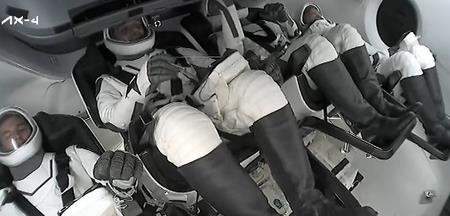Indian Astronaut Shubhanshu Shukla Orbiting Earth, To Dock Today At Space Station
Lucknow-born Shukla launched to the ISS at 2:31 a.m. EDT (12 noon IST), from Launch Complex 39A at NASA's Kennedy Space Centre in Florida, aboard a new SpaceX Dragon spacecraft on the company's Falcon 9 rocket.
"The SpaceX Dragon spacecraft carrying four Axiom Mission 4 (Ax-4) crew members is orbiting Earth and on its way to the International Space Station after launching from Kennedy Space Center at 2:31 a.m. EDT on Wednesday," NASA shared in an update.
Dragon is carrying Ax-4 Commander Peggy Whitson, Pilot Shubhanshu Shukla, and Mission Specialists Sławosz Uznański-Wiśniewski and Tibor Kapu.
It "will dock to the Harmony module's space-facing port at 7 a.m. on Thursday," NASA added.
After 41 years, India now will have an astronaut in space. Shukla will also be the second Indian in space after Rakesh Sharma's flight in 1984.
In his message on the way to the ISS, Shukla said, "Namaskar, my dear countrymen! What a ride! We are back in the space once again after 41 years. It's an amazing ride. We are revolving around the Earth at a speed of 7.5 kilometres per second.”
"This is not my journey alone, but I am carrying the Indian flag with me, and this is the journey of India's human space flight," Shukla added.
He is carrying carrot halwa, moong dal halwa and mango nectar with him to satiate his cravings for home-made food in space.
The Axiom-4 Mission is not just a scientific feat but a testament to India's rising stature as a global technology powerhouse. It reinforces the nation's capability to lead space innovation, promote sustainability, and contribute meaningfully to global missions.
Once aboard the ISS, Shukla will conduct pioneering experiments related to food and space nutrition.
These experiments, developed under a collaboration between ISRO and the Department of Biotechnology (DBT), with support from NASA, aim to enhance understanding of sustainable life-support systems, a crucial aspect of future long-duration space travel.
The research will also study the effects of microgravity and space radiation on edible microalgae -- a nutrient-rich, high-potential food source for future space missions. The experiment will evaluate key growth parameters and examine transcriptomic, proteomic, and metabolomic changes in different algal species in space compared to their behaviour on Earth.

Legal Disclaimer:
MENAFN provides the
information “as is” without warranty of any kind. We do not accept
any responsibility or liability for the accuracy, content, images,
videos, licenses, completeness, legality, or reliability of the information
contained in this article. If you have any complaints or copyright
issues related to this article, kindly contact the provider above.
Most popular stories
Market Research

- Motif AI Enters Phase Two Of Its Growth Cycle
- Chaingpt Pad Unveils Buzz System: Turning Social Hype Into Token Allocation
- NOVA Collective Invest Showcases Intelligent Trading System7.0 Iterations Led By Brady Rodriguez
- With Seal, Walrus Becomes The First Decentralized Data Platform With Access Controls
- B2PRIME Secures DFSA Licence To Operate From The DIFC, Setting A New Institutional Benchmark For MENA & Gulf Region
- Bitmex Launches Alpha Showdown Trading Competition Featuring 3 BTC Prize Pool And Additional Rewards





















Comments
No comment